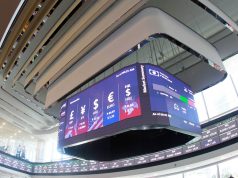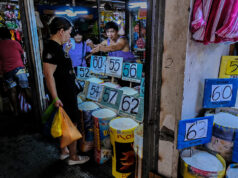A glimpse of the beginnings of a growing empire
By Marifi S. Jara
Mindanao Bureau Chief
DAVAO CITY — Dennis A. Uy’s Udenna Group of Companies has pending proposals for two major infrastructure projects in Davao City: a P30-billion monorail that already has a stamp for Original Proponent Status from the Department of Transportation, and the development and management of the Davao International Airport under an unsolicited 30-year private-public partnership contract.
Though Mr. Uy has often been referred to as the “Davao-based businessman,” these two projects actually mark more of a return to Mr. Uy’s southern roots as his diversified interests have, in fact, pulled him out of his hometown over the years with nationwide expansion and ventures in the country’s north.
“He does not really hold office here, I have not actually seen him,” said one long-time worker of Udenna subsidiary Global Synergy Trade And Distribution Corp., which is based in the holding company’s published Barrio Obrero office in Davao City.
Global Synergy was among the first companies of the group, formed just after Phoenix Petroleum Holdings, Inc., Udenna Management & Resources Corp., and Chelsea Shipping Corp., all registered in 2006.
Udenna Corp. itself was born four years earlier, just two months ahead of Phoenix Petroleum Philippines, Inc.’s May 2002 establishment.
Phoenix Petroleum, a family business that became the first independent oil firm to list on the Philippine Stock Exchange (PSE) in July 2007 after enactment of the 1998 Oil Deregulation Law, has been growing, raking in P1.79-billion net income for 2017, up 65% from the previous year.
It has five of its own subsidiaries: Phoenix LPG Philippines, Inc.; PNX Petroleum Singapore Pte Ltd.; Subic Petroleum Trading and Transport Phils., Inc. (SPTT); P-F-L Petroleum Management, Inc. (PMI); and Philippine FamilyMart CVS, Inc.
The Phoenix Petroleum main office in Davao City remains Udenna Corp.’s published headquarters even after the topping off ceremony earlier this year of its own 24-storey corporate building at the Bonifacio Global City in the capital Metro Manila.
Continuing to be Udenna’s crown jewel, Phoenix Petroleum, based on its end-Sept. report this year, now has a nationwide network of 558 retail stations, including franchises, from only an initial five within Davao and other parts of Mindanao in 2005.
BUSINESS AND BASKETBALL
Ian Ray C. Garcia, a high school classmate at the Stella Maris Academy in Davao, remembers Mr. Uy as someone passionate about two things: business and basketball.
Mr. Garcia, a lifestyle writer for a local newspaper and blogger, said the young Uy always brought a basketball and played at the school gym, and during conversations about their teenage dreams, talked about building a business.
“He would tell us that he wanted to succeed in business by going into franchising,” Mr. Garcia, told BusinessWorld.
Mr. Uy did eventually go into franchising, but not as a franchisee.
His Phoenix Petroleum was awarded Outstanding Filipino Franchise in Retail-Large Store category in the 2015 Franchise Excellence Awards.
As for basketball, he’s now got his own professional team — the two-year old Phoenix Fuel Masters, which plays in the Philippine Basketball Association league.
TIES WITH THE GOKONGWEIS
The oil company, which now provides fuel services in 18 domestic airports, had Cebu Pacific, the Gokongwei family’s budget airline, as its first major client.
Phoenix Petroleum has grown as the airline’s major fuel supplier and exclusive logistics provider in Mindanao.
The Uy-Gokongwei partnership has also extended into the hotel business, with Udenna and the Gokongwei’s Robinsons Land Corp. forming GoHotels Davao, Inc. for the budget hotel branch in Davao City.
Go Hotels Davao, the biggest provincial branch in the chain, is just less than six kilometers away from the airport that Udenna’s Chelsea Logistics Holdings Corp.(CLC) aims to expand and operate.
Under CLC’s proposal, which was disclosed to the PSE in March this year, a new taxiway will be built that can accommodate 30 hourly aircraft movements and the cargo terminal’s capacity will be tripled by the end of the 30-year concession period.
The Davao monorail, meanwhile, would initially stretch for 13 kilometers through the city’s central urban area, with an option for a possible extension to the airport, based on a press release issued by the company in May this year.
Dubbed the Davao People Mover, the metro railway proposal already has support from the Davao City council.
Councilor Jesus Joseph P. Zozobrado, chair of the public works committee and vice-chair of the transportation committee, said he sees the monorail complementing the High Priority Bus System, which is expected to be rolled out starting next year.
Mr. Zozobrado, in an interview last Oct. 23 before a council session where the monorail was to be discussed, said the project would help address the creeping traffic congestion.
“This is one problem that has crossed the social and economic divide. Everyone, at one time or another, is bound to experience the traffic congestion in the city,” he said.
Engineer Manuel T. Jamonir, business development manager of Udenna Infrastructure, said the company hopes to get government approval soon and start construction by 2020, with completion targeted in three to four years. It will be under a 35-year concession period, then will be turned over to the government.
On top of these proposed projects in Mr. Uy’s hometown, the Udenna Group also has its basket full with such big ventures as the 177-hectare Clark Global City under Global Gateway Development Corp.
TELCO
But the most ambitious — and most controversial — undertaking so far of the 44-year-old entrepreneur is in yet another sector: telecommunications.
It was not until Nov. 7 — on the day of submission and opening of bids for the country’s third major telecommunications service provider — that Mr. Uy’s Udenna and CLC confirmed their partnership with China Telecom, the foreign telco which President Rodrigo R. Duterte, a fellow Davaoeño, said in December last year should get the job. The consortium was provisionally named the country’s third major telco the same day under the name of its franchise holder, Mindanao Islamic Telephone Company, Inc. (Mislatel), after its only two competitors were disqualified. It was formally declared third major telco on Monday.
Opposition senators have raised questions about the bidding, noting that while the country’s telecom industry needs more players and improvement in services, “we need to do things right.”
In a joint statement on Nov. 8, minority Senators Franklin M. Drilon, Risa N. Hontiveros-Baraquel, Leila M. De Lima, Francis N. Pangilinan, and Antonio F. Trillanes IV said: “The selection of the joint venture of a Davao-based businessman and state-owned China Telecom as the provisional new major telecommunications player should be examined carefully.”
“What qualified it in the first place? Why were the other bidders booted out? What is the track record of the winning bidder in the telecommunications business? Was the government opening up the bidding to other players just a formality? In December 2017, Malacañang said it wants the government to ensure that China Telecom can begin its Philippine operations by the first quarter of 2018. Ito na ba ‘yun (Is this it)? ” they said.
In Nov. 2017, Malacañang did announce that Mr. Duterte offered China the opportunity to enter the local telecommunications scene in hopes of breaking the duopoly of industry giants PLDT, Inc. and Globe Telecom, Inc. China Telecom Corp. Ltd. was later named as China’s chosen investor, but given the country’s 40% foreign ownership restriction, it needed to find a local partner.
The Department of Information and Communications Technology and the National Telecommunications Commission then proceeded to form a set of rules in bidding out what would be the “new major player” crown.
Several local and foreign firms were identified as interested parties months before the auction.
Although PLDT, Inc. and Globe Telecom, Inc. say they are not worried just yet of significant impacts to their businesses with Mislatel’s entry, the government is hopeful of its capability to shake up the country’s telco landscape.
The Uy-led consortium committed in its first five years of operations a total capital and operational investment of P257 billion. It also said it will deliver an average broadband speed of 27 Megabits per second (Mbps) in its first year of business and 55 Mbps in the succeeding years, and will cover 37% of the population within its first 12 months of operations.
Compared to how the incumbents currently fare — with average download speed at 5 Mbps for Globe and 7.5 Mbps for PLDT’s wireless unit Smart, according to an August report from wireless coverage mapping company OpenSignal — Mislatel does have the potential to disrupt the telco scene if it delivers on its promises.
What remains to be seen is how far political and legal resistance will go against the telecommunications foray of Mr. Uy — the young entrepreneur from Davao who steadily built a national business empire in the last 16 years, but has now come under the shadow of his hometown’s most famous political son. — with Denise A. Valdez, Arra B. Francia and Carmelito Q. Francisco
Click here to see related timeline.



